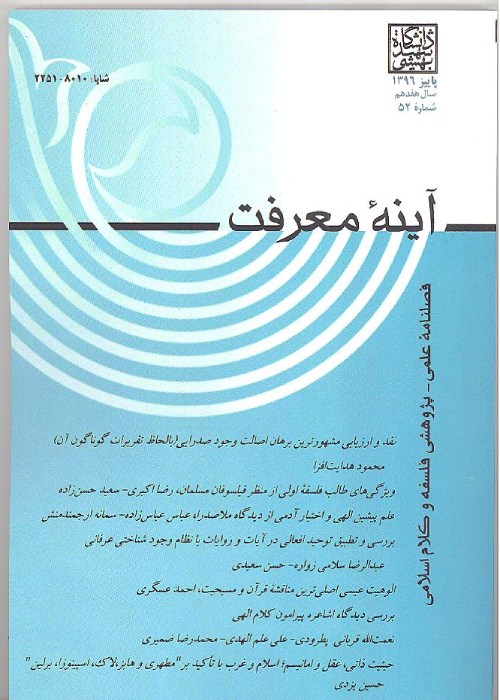A Critical Examination of a Criticism on the Truth Functional System of Basic Propositional Logic Are The Ways of Proving the EQT and EFQ Principles Closed?
The validity of deductive reasoning is the main subject of logical theories. According to the definition of validity of reasoning in Classical Logic, deducing the conclusion from the premises by applying the rules of inference is a necessary and sufficient condition for validity. Therefore, and known as EFQ and EQT principles, are valid. However, our natural intuition does not confirm the validity of these two arguments. In dealing with those principles, we face with three approaches. Some logicians have tried to close the ways of proving these principles with some adjustments at some foundations or some syntactical and semantic rules of Classical Logic. Some other logicians have divided the material implication paradoxes into two kinds of conventional and logical paradoxes, calling EFQ and EQT conventional paradoxes rather than logical paradoxes. Another group’ of logicians believe that the mathematical proofs follow the classical logic, but they rely on principles such as “reductio ad absurdum”, “the conditional proof”, “the disjunctive syllogism”, and “the law of absorption”, which are established in the field of mathematics and cannot be applied to other fields. Based on this approach, the above-mentioned principles can only be taken seriously if they have an effective application in logic and mathematics. In facing with this problem, we have taken the first approach in discussing on the classical truth-function system in Propositional Logic. Moreover, by adding two new conditions for the validity of arguments, we have given a new definition of validity. Based on this definition, the validity of arguments and is no longer proved. This definition requires some revisions in the rules for inference and the arguments in Classical Logic. These changes have led to the establishment of the truth-function system of Propositional Logic, which is free from the paradoxes and challenges of the Classical Logic, and, in my view, has achieved its goals. Âsâdollāh Fâllāhī has criticized this theory in a paper entitled “HajiHosseini’s Truth-Functional System”, published in Ᾱyeneye Mâʻârefât, Spring 2023. The “circular definition of the validity of arguments” is Fâllāhī’s main criticism of this theory, which we have answered in this paper. The point is that in discovering the contradiction, by which the proof is finished, it is not necessary to satisfy the syntactical condition of the premises’ not being inconsistent. Therefore, in the truth-function system the formula’s not being inconsistent should be discerned independently of the new conditions for the validity of arguments in the same way as Classical Logic, with the difference that in the truth-function system some rules of inference don’t change, and so the vicious circle doesn’t follow. “The Loss of the Substitution Rule”, “Non-Validity Preservation of Substitution Rule”, “The Incompatibility of the Conditional with Deduction”, and “Deductions’ not being relevant” are other criticisms that have been arisen by using the criteria of Classical Logic or Relevant Logic. But since these criticisms require leaving the criteria of criticism, we have regarded them as rejected criticisms. “The counterexample for defining the syntactical consequence” and “equivalence of a formula with several non-equivalent formulas” are two other criticisms of Fâllāhī’s paper; the first arises from an inadvertent error in book, which needs to be corrected, and the second is based on a presupposition which is ambiguous, and by clarifying it the objection is answered. Besides, three other criticisms called “loss of reductio ad absurdum”, “ambiguity in the definition of harmony”, and “the artificiality of the condition "not being a theorem" in the definition of formulas substitution-instances” arise from misunderstanding HajiHosseini’s book entitled A New Sketch for the Principles and Foundations of Logic, and have been answered. There were some other criticisms that we have discussed and answered under the title “Scientific Criticisms”. In criticizing a theory, it is expected that the basic assumptions of the theory, which any change in them leads to the loss of the theory, be separated from the other assumptions that are not so. Also, the assumptions on which the theory is based should be discerned and considered. Similarly, it is expected that the areas which, based on the theory, need to be revised, and be identified and examined whether those areas have been or haven’t been revised. Besides, it should be noticed that the criticisms be related to the basic assumptions and to the revisions arisen from those assumptions, and the criticisms be not judged by the standards of other theories. In addition, the criticisms which relate to other assumptions, should be presented separately and, if possible, in the form of proposed corrections. In this paper, however, we have shown that almost none of the above-mentioned norms has been observed in Fâllāhī’s critique of the theory of the truth-function system of Propositional Logic. In response to some criticisms, we have noted that in criticizing a theory we should not depart from the requirements of criticism and judge a theory by other theoretical criteria. In this paper, based on the assumption that the logical theories are not excluded from the scientific theories, we have argued that the best theory is a theory which provides a better explanation of the evidence in comparison with scientific theories. In the field of logic, the criteria of expressiveness, separation of propositions, explanatory power, separation of inferences, consistency, coherence, compatibility with the evidence, sufficiency of data, clarity, simplicity, and unification are the criteria for preferring a logical theory to other logical theories.
- حق عضویت دریافتی صرف حمایت از نشریات عضو و نگهداری، تکمیل و توسعه مگیران میشود.
- پرداخت حق اشتراک و دانلود مقالات اجازه بازنشر آن در سایر رسانههای چاپی و دیجیتال را به کاربر نمیدهد.



